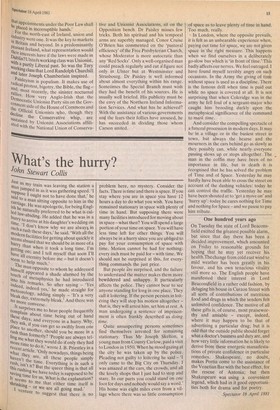What's the hurry? John. Stewart Collis John. Stewart Collis Just
as my Just as my train was leaving the station a man jumped in as it was gathering speed. 'I suPPose I ought not to have done that,' he Said to a ca man sitting opposite to him in the rriage.0 was apologetic, for being English he naturally preferred to be what is cal led la i w-abiding. He added that he was n a hurry to arrive at his daughter's wedding on don't know why we are alwaY5, m such a rush these days,' he said. 'With all the modern facilities for getting about quickly It seems absurd that we should be in more of a hurry than when it took a long time. I'm getting on; and I tell myself that soon I'll have all eternity before me — but it doesn't seem to help much.' L. The man opposite to whom he addressed "linsell appeared a shade alarmed by the touch of metaphysics he had introduced trito his remarks. So after saying — 'Yes. Indeed, indeed yes,' he made straight for meteorology, adding simply — 'It's a very bleak day, extremely bleak.' And there was 110 more converse. It surprises me to hear people frequently complain about time being out of hand these days, and everyone in a hurry. Why, they ask, if you can get so swiftly from one Place to another, should you be more in a rush than formerly? 'People are always telling me what they would do if only they had more time to do it,' wrote J. B. Priestley in a recent article. 'Only nowadays, things being What they are all these People simply haven:t the time. Everything is in such a ru.sh, Isn't it? But the queer thing is that all this rushing we have today is supposed to be saving time for us. What is the explanation? It seems to me that either time itself is Shrinking — or we are all going mad.' I venture to suggest that there is no problem here, no mystery. Consider the facts. There is time and there is space. If you stay where you are in space you have 12 hours a day to do what you wish. You have remained stationary in space with plenty of time in hand. But supposing there were many facilities introduced for moving about in space — what then? You will spend a large portion of your time on space. You will have less time left for other things. You will always be in a hurry since you are obliged to pay for your consumption of space with time. Motion cannot be had for nothing: every inch must be paid for — with time. We should not be surprised at this, for everything commands the just price. But people 'a\re surprised, and the failure to understand the matter makes them more bewildered and unhappy. It particularly affects the police. They cannot bear to see anyone standing for long in one place. They call it loitering. If the person persists in loitering they will stop his motion altogether — that is, they will arrest him, set him at rest. A man undergoing a sentence of imprisonment is often frankly described as doing time.
Quite unsuspecting persons sometimes find themselves arrested for remaining stationary. Thus Mr Joseph Skelton, a young man from County Carlow, paid a visit to London in 1950. When he stood gazing at the city he was taken up by the police. Pleading not guilty to loitering he said — 'I only came to the Big City on Thursday. I was amazed at the cars, the crowds, and all the lovely shops that I just had to stop and stare. In our parts you could stand on one foot for days and nobody would say a word.' His home was eight miles even from a village where there was so little consumption of space as to leave plenty of time in hand. Too much, really.
In London, where the opposite prevails, it is felt as an unbearable experience when, paying out time for space, we are not given space in the right measure. This happens when we find ourselves in a deliberately go-slow bus which is 'in front of time.' This badly affects our nerves. We feel outraged. I have found myself terribly angry on such occasions. In the Army the giving of time without space is used as a discipline. There is the famous drill when time is paid out while no space is covered at all. It is not surprising that when Coleridge was in the army he fell foul of a sergeant-major who caught him brooding darkly upon the metaphysical significance of the command to mark time.
And consider the compelling spectacle ot a funeral procession in modern days. It may be in a village or in the busiest street in town, but always the hearse and the mourners in the cars behind go as slowly as they possibly can, while nearly everyone passing slows up or stops altogether. The man in the coffin may have been of no importance in life, but in death it is tecognised that he has solved the problem of Time and of Space. Yesterday he may hardly have been able to cross the street on account of the dashing vehicles: today he can control the traffic. Yesterday he may have been shouted at to 'get a move on' and 'hurry up': today he cares nothing for Time and nothing for Space — and we pause to pay him tribute.






































 Previous page
Previous page